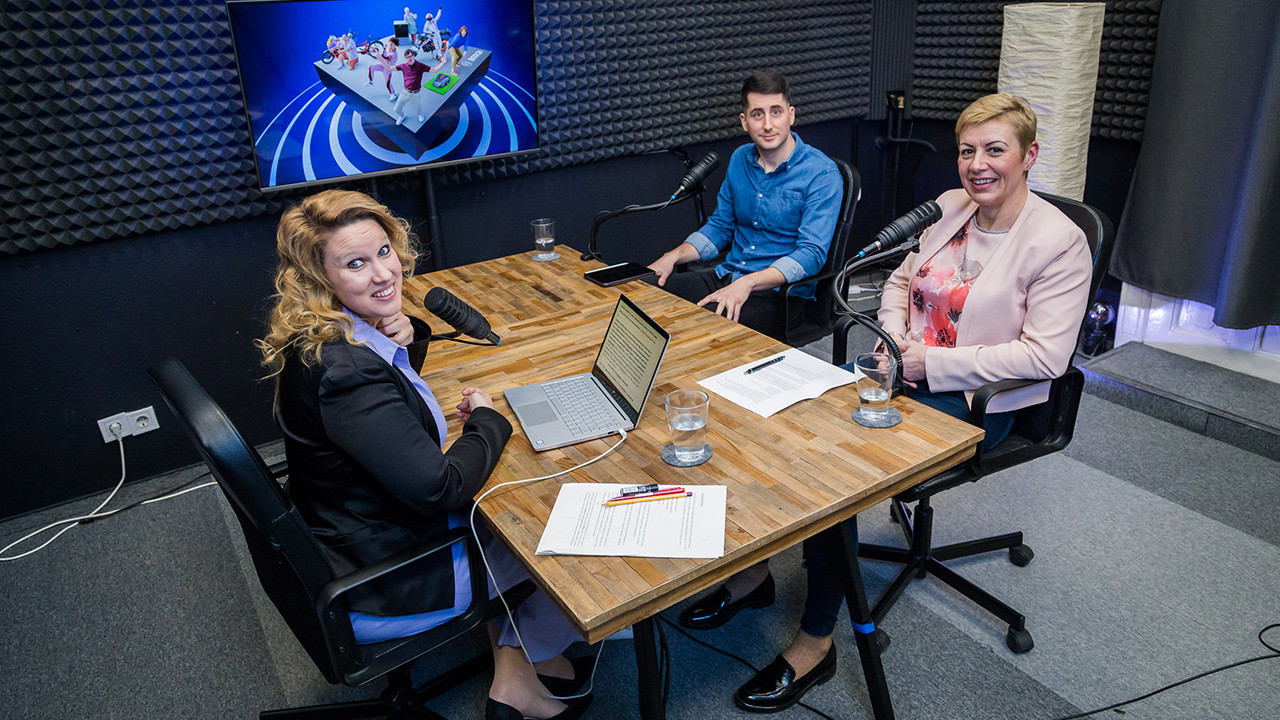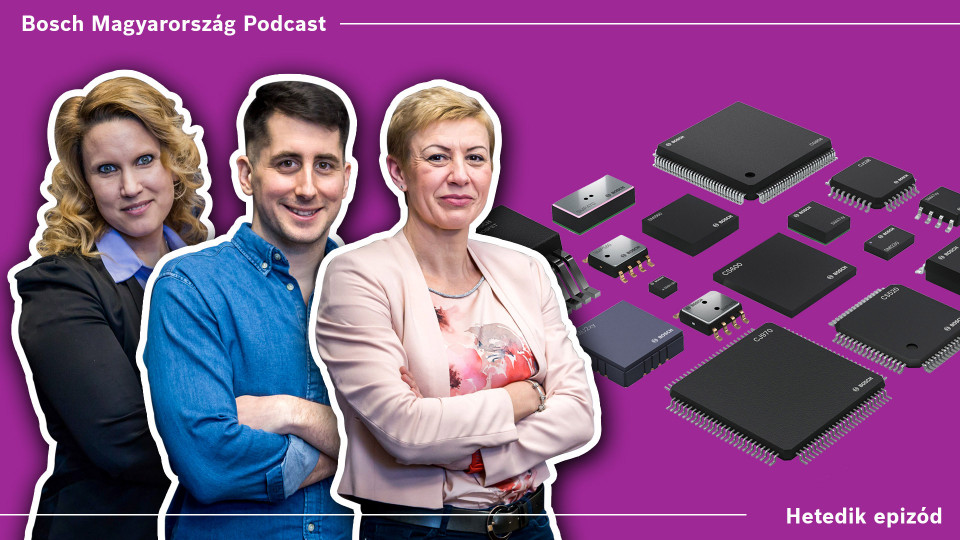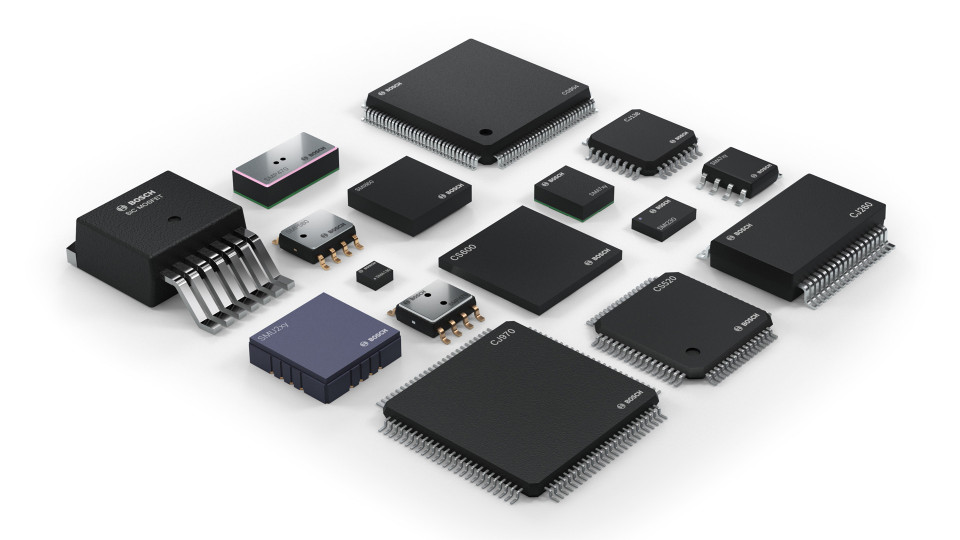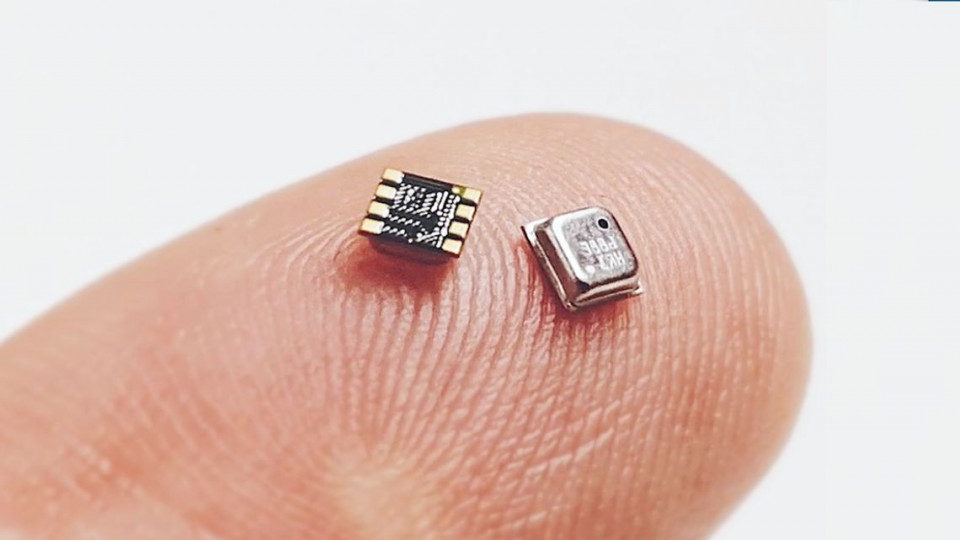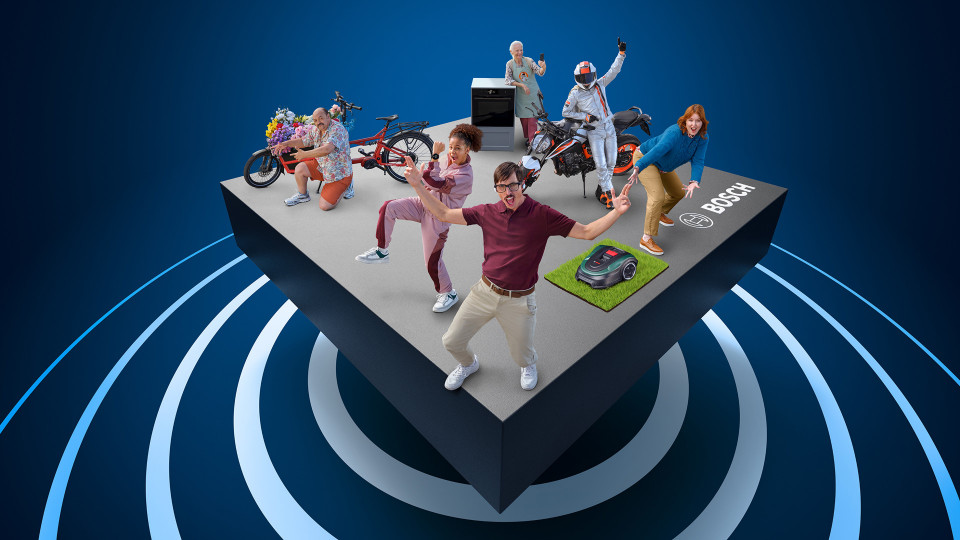As well as our environment, we ourselves are being monitored by the tiny sensors that are infiltrating our daily lives, making our lives safer and more comfortable. They're in our cars, our watches, our phones, everywhere we go in our cities, and soon they'll be embedded in our glasses, our clothes and even our bodies. To what extent is this a blessing or a curse, where is the sensor revolution currently and where is it going? Can they fundamentally change the real estate market? The latest technological developments and real solutions that seem like they are from the realm of sci-fi are discussed in an accessible way by the invited experts on the latest episode of the Bosch Hungary Podcast.
Five million sensors a day
Twenty sensors in a single smartphone? Yes! In fact, an electric car can have hundreds of them! The global Bosch Group produces around five million of these tiny sensors every day, and around one and a half billion a year. This is just the present, but the market for semiconductors is predicted to triple by 2030, according to the latest Bosch Hungary Podcast, in which Dr. Andrea Edit Csikósné Pap, deputy dean of education at the Kandó Kálmán Faculty of Electrical Engineering at Óbuda University and Norbert Mezősi, mechanical engineer and economist, head of Bosch Hungary's sensor design team, are interviewed by Edit Tóth, digital manager of the communications and government relations department at Robert Bosch Kft.
Smart glasses facing a market explosion
Sensors are getting smaller, faster and more and more of them are being used in our devices. After smart sensors in vehicles and earphones, the next market explosion could come from smart glasses, according to the Bosch expert. It is expected to become widely popular, for example, that our sensor-enabled glasses will follow our head movements while driving, showing us the right direction to take or alerting us about dangerous situations. But cooking will also become more enjoyable for cooking enthusiasts, as they will make it easier to portion ingredients, measure quantities and prepare food.
Sensors could revolutionize the real estate market
As well as increasing our personal comfort and safety, the new generation of sensors could also fundamentally transform the commercial and business world. After automating warehouses with thousands of sensors, smart shopping trolleys could arrive that read the barcodes of the products placed in them, speeding up the shopping process. And a recently introduced Bosch optical sensor for measuring air pollution, when integrated into everyday mobile devices, could even turn the real estate market on its head by providing local air pollution data at the touch of a button, says Bosch's expert in sensor design.
911: life-saving sensors
The latest sensors are also playing an active role in life-saving and disaster relief duties, as the 911 emergency hotline in the US uses data from air pressure sensors in the phones to tell dispatchers not only where a call for help is coming from, but also from which level. This knowledge can save lives not only in skyscrapers, but also in traditional housing estates.
Smart wound dressings
The healthcare sector is also building on the information provided by sensors in many areas. Smartwatches that measure blood pressure and heart rate are now commonplace, but perhaps few people have heard of the special sensors integrated into wound dressings that can monitor wound healing processes by sensing pH levels – something that is also discussed in the Bosch podcast.
Are sensors built into our bodies the future?
The future clearly lies in quantum sensors, which can provide a thousand times the current measurement accuracy, according to the Bosch podcast. In addition to gathering scientific insights this will allow them to track the functioning of our nervous system, for example, and even support the diagnosis and targeted treatment of serious diseases. The new type of quantum sensors could even act as implants in our bodies, given their tiny size. However, alongside the medical benefits, the dilemma arises – as it does for the experts in the Bosch podcast and presumably also for the listeners - whether this futuristic possibility should be greeted as a new horizon of development or rather with caution and distance.
Bosch Hungary Podcast: technology in plain language
The Bosch Hungary Podcast is a quarterly podcast on the most current issues in innovation and R&D, with expert guests providing accessible answers to the most pressing questions about the technology of the future. Those who want to learn more about the future of sensors and their surprising applications, or to get an idea of where sensor technology expertise can be learned and applied in Hungary, can listen to the answers and even watch the Bosch Hungary Podcast on YouTube, Spotify, Apple Podcasts, Google Podcasts and Simplecast.
Zita Hella Varga
Phone: +36 70 667-6374
Bosch has been present in Hungary since 1898 with its products. After its re-establishment as a regional trading company in 1991, Bosch has grown into one of Hungary’s largest foreign industrial employers with currently eight subsidiaries. In fiscal 2021 it had total net sales of 1,711 billion forints and consolidated sales to third parties on the Hungarian market of 273 billion forints. The Bosch Group in Hungary employs more than 17,000 associates (as of December 31, 2021). Figures of fiscal 2022 for the Bosch Group in Hungary will be available from May 25, 2023. In addition to its manufacturing, commercial and development business, Bosch has a network of sales and service operations that covers the entire country.
The Bosch Group is a leading global supplier of technology and services. It employs roughly 420,000 associates worldwide (as of December 31, 2022). According to preliminary figures, the company generated sales of 88.4 billion euros in 2022. Its operations are divided into four business sectors: Mobility Solutions, Industrial Technology, Consumer Goods, and Energy and Building Technology. As a leading IoT provider, Bosch offers innovative solutions for smart homes, Industry 4.0, and connected mobility. Bosch is pursuing a vision of mobility that is sustainable, safe, and exciting. It uses its expertise in sensor technology, software, and services, as well as its own IoT cloud, to offer its customers connected, cross-domain solutions from a single source. The Bosch Group’s strategic objective is to facilitate connected living with products and solutions that either contain artificial intelligence (AI) or have been developed or manufactured with its help. Bosch improves quality of life worldwide with products and services that are innovative and spark enthusiasm. In short, Bosch creates technology that is “Invented for life.” The Bosch Group comprises Robert Bosch GmbH and its roughly 440 subsidiary and regional companies in some 60 countries. Including sales and service partners, Bosch’s global manufacturing, engineering, and sales network covers nearly every country in the world. With its more than 400 locations worldwide, the Bosch Group has been carbon neutral since the first quarter of 2020. The basis for the company’s future growth is its innovative strength. At 128 locations across the globe, Bosch employs some 85,000 associates in research and development, of which more than 44,000 are software engineers.
The company was set up in Stuttgart in 1886 by Robert Bosch (1861–1942) as “Workshop for Precision Mechanics and Electrical Engineering.” The special ownership structure of Robert Bosch GmbH guarantees the entrepreneurial freedom of the Bosch Group, making it possible for the company to plan over the long term and to undertake significant upfront investments in the safeguarding of its future. Ninety-four percent of the share capital of Robert Bosch GmbH is held by Robert Bosch Stiftung GmbH, a charitable foundation. The remaining shares are held by Robert Bosch GmbH and by a corporation owned by the Bosch family. The majority of voting rights are held by Robert Bosch Industrietreuhand KG, an industrial trust. The entrepreneurial ownership functions are carried out by the trust.
Additional information is available online at www.bosch.hu, iot.boschblog.hu, www.bosch.com, www.iot.bosch.com, www.bosch-press.com, www.twitter.com/BoschPresse

